 Petzlover
Petzlover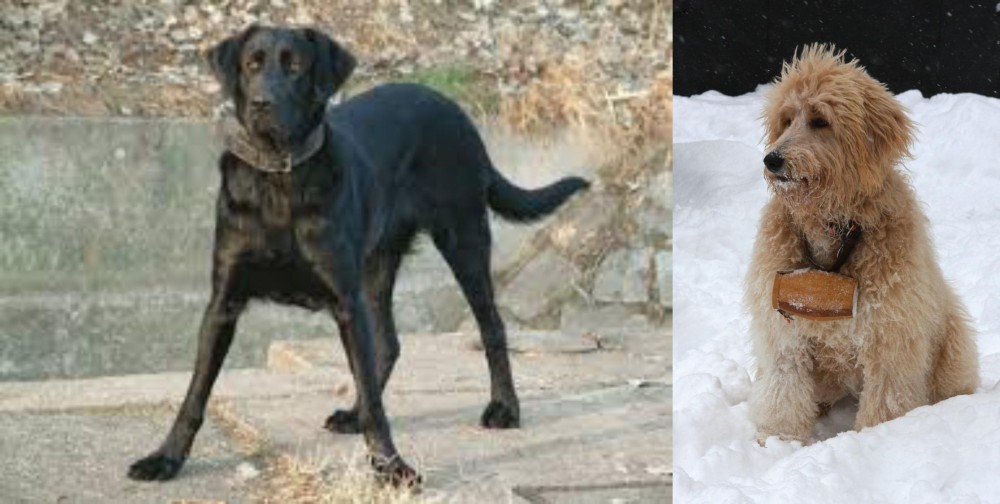 Cao de Castro Laboreiro is originated from Portugal but Pyredoodle is originated from United States. Cao de Castro Laboreiro may grow 26 cm / 10 inches shorter than Pyredoodle. Cao de Castro Laboreiro may weigh 24 kg / 53 pounds more than Pyredoodle. Both Cao de Castro Laboreiro and Pyredoodle has same life span. Cao de Castro Laboreiro may have more litter size than Pyredoodle. Cao de Castro Laboreiro requires Low Maintenance. But Pyredoodle requires Moderate Maintenance
Cao de Castro Laboreiro is originated from Portugal but Pyredoodle is originated from United States. Cao de Castro Laboreiro may grow 26 cm / 10 inches shorter than Pyredoodle. Cao de Castro Laboreiro may weigh 24 kg / 53 pounds more than Pyredoodle. Both Cao de Castro Laboreiro and Pyredoodle has same life span. Cao de Castro Laboreiro may have more litter size than Pyredoodle. Cao de Castro Laboreiro requires Low Maintenance. But Pyredoodle requires Moderate Maintenance
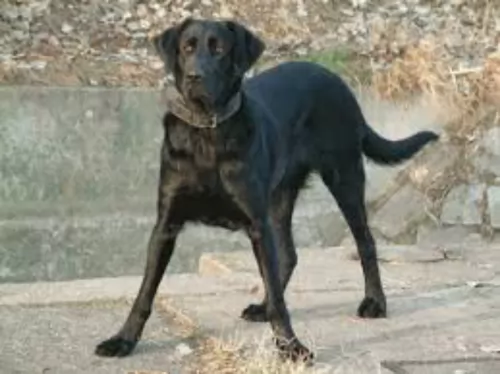 Cão de Castro Laboreiro originates from Portugal. Also known as the Portuguese Cattle Dog he was used long ago to guard livestock. Today, the modern Cao de Castro Laboreiro is descended from the molosser type dog.
Cão de Castro Laboreiro originates from Portugal. Also known as the Portuguese Cattle Dog he was used long ago to guard livestock. Today, the modern Cao de Castro Laboreiro is descended from the molosser type dog.
There are hints to the dog's origins from the 19th century, but changes in agricultural methods meant a disappearance of the dog as a livestock protector. Today the dog is mostly kept as a pet and was first seen at a dog show in 1914.
The Cão de Castro Laboreiro is recognized by the Fédération Cynologique Internationale as well as being recognized by the United Kennel Club in the United States.It is a rare dog and not many exist today but in Portugal, the USA and United Kingdom you will find a few breeders.
 These dogs only originated in the 1980s, and as a designer dog they are a cross between a Standard Poodle and the Great Pyrenees, both ancient dog breeds.
These dogs only originated in the 1980s, and as a designer dog they are a cross between a Standard Poodle and the Great Pyrenees, both ancient dog breeds.
The breeders were looking for a non-shedding variation of both these popular breeds. This dog isn’t part of the American Kennel Club’s (AKC) list of dogs.
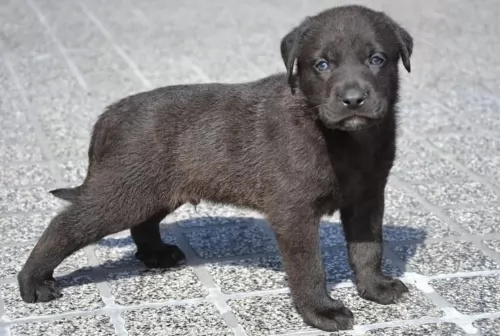 The Cão de Castro Laboreiro is a large dog, with height being in the region of 55 to 60cm and weight being in the region of 45 - 70kg. People describe the dog as wolf-like with a coat that is fairly short, thick and course. The coat is brindle with a base color of shades of grey, chestnut and black.
The Cão de Castro Laboreiro is a large dog, with height being in the region of 55 to 60cm and weight being in the region of 45 - 70kg. People describe the dog as wolf-like with a coat that is fairly short, thick and course. The coat is brindle with a base color of shades of grey, chestnut and black.
This large mastiff-type dog always has a black nose, his tail is long and carried high, but never curling over the back. He has a broad head and is much like the Labrador in looks, being free of wrinkles on the face.The ears of the Cao de Castro Laboreiro are medium-in-size and floppy while the eyes are dark brown.
The Cao de Castro Laboreiro makes an excellent pet as he forms strong bonds with his human family. He is territorial and makes an exceptional guard dog. He doesn’t particularly like strangers and is aloof around them.
This is an intelligent dog breed, he is strong-willed and stubborn, but when he is around the children in the family he is gentle and loving. When he has been trained and socialized, which is always highly recommended with every dog, he gets along with other pets in the home too.
 The Pyredoodle is a large dog standing at between 60 and 86cm in height and weighing about 38 to 46kg.
The Pyredoodle is a large dog standing at between 60 and 86cm in height and weighing about 38 to 46kg.
The coat varies quite a bit, depending on which breed the dog leans towards. Colors can be white, cream, apricot, silver or black. Essentially the coat is a thick double-coat of medium length hair which is fairly straight or wavy.
The dog is a low shedder, thought to have a hypoallergenic coat. Floppy ears mean you will need to check inside the ears for redness and infection brought on by an excess wax build-up, dirt and moisture. If you allow your Pyredoodle to become a parent, the can produce between 2 to 4 puppies.
Coming from dogs with good temperaments, the Pyredoodle comes as being good natured. He plays well with children and gets on well with other animals in the house.
He is protective and takes his role as watchdog seriously. You can be sure he is going to be a loyal family dog. His high intelligence means he can be trained and socialized with ease and then he becomes obedient and well mannered.
He is good with children, and even though he is looked upon as being sweet natured, he still makes a great watchdog and protector of his human family.
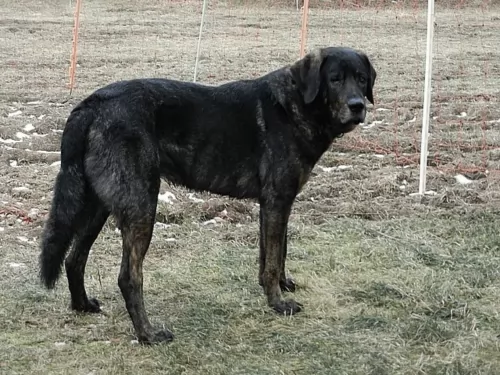 Environment and upbringing have plenty to do with how a dog turns out. People who just buy a dog for guardian purposes and nothing else can’t expect companionship in return.
Environment and upbringing have plenty to do with how a dog turns out. People who just buy a dog for guardian purposes and nothing else can’t expect companionship in return.
The Cão de Castro Laboreiro has always been a fearless guardian of livestock with his strong protective characteristics. He is intelligent and recognizes that a child in the family needs his protection.
This is a large dog who is strong, brave and intelligent but with his human family he is gentle, loving and loyal. Nonetheless he still requires a firm owner, and if you’re fair and firm with him you get the best with him. With this dog you can form a close friendship and bond.
 Attractive to look at, independent in nature, the Pyredoodle also has watchdog characteristics, being a protector of his human family.
Attractive to look at, independent in nature, the Pyredoodle also has watchdog characteristics, being a protector of his human family.
Like any dog, and particularly big dogs, it is important to train the Pyredoodle otherwise he could be too active and unruly when he comes indoors.
The Pyredoodle will absolutely thrive in a loving home where the people enjoy an active lifestyle.
The Pyredoodle comes from too excellent dog breeds. Both breeds make excellent watch dogs, they’re intelligent dogs who can be easily be trained. You can expect your crossbreed dog to be a loving, loyal, devoted pet who will add a wonderful dimension to your household.
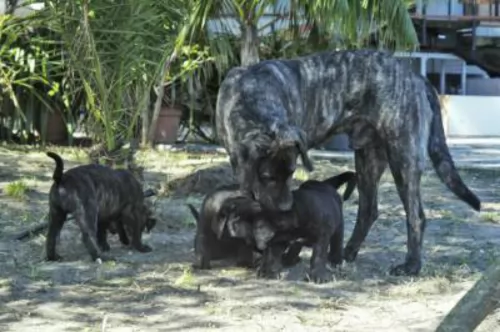 The Cão de Castro Laboreiro is generally a healthy breed, but even so, it is good to be aware of typical canine diseases that your pet may develop.
The Cão de Castro Laboreiro is generally a healthy breed, but even so, it is good to be aware of typical canine diseases that your pet may develop.
There are many eye problems that dogs have to contend with and if you see any kind of ulceration in your dogs eye, get veterinary advice.
A dog should always have access to a shady spot. Never ever leave your dog in a hot car. Heat builds up quickly and death can result soon as the body temperature rises.
Roundworm and tapeworm can infest dogs and you’ll need to speak to your vet about a worming program. Lice, mites and ticks are all parasites which attach themselves to the skin.
 Designer dogs are often bred with the idea to eliminate some of the typical, common health issues that plague most dogs. These are among others, bloat, cancer, hip dysplasia, skin issues, ear infections, obesity, dental disease and others.
Designer dogs are often bred with the idea to eliminate some of the typical, common health issues that plague most dogs. These are among others, bloat, cancer, hip dysplasia, skin issues, ear infections, obesity, dental disease and others.
It is highly unlikely that your lively Pyredoodle will succumb to any of the major dog illnesses, but you need to watch him and get him to the vet when you see him displaying unnatural symptoms.
It is beneficial for your pet's health to have it neutered or spayed if you aren't interested in the dog having puppies.
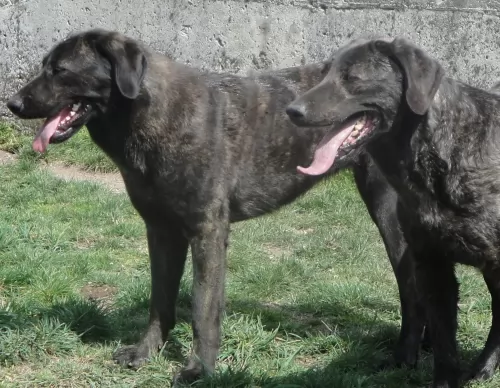 The Cao de Castro Laboreiro has a short coat which requires minimal grooming. Brushing him twice a week to rid him of loose hairs will suffice.
The Cao de Castro Laboreiro has a short coat which requires minimal grooming. Brushing him twice a week to rid him of loose hairs will suffice.
Nail clipping as well as ear- and teeth cleaning are other routine maintenance procedures for your pet.
The food you give your pet must be well-balanced and have protein and carbohydrates. If you want his skin and hair to remain healthy, vitamins, fatty acids and minerals will also be needed.
Boneless chicken and fish, brown rice and vegetables can be a good choice as well as some of the top quality commercially manufactured foods. An active dog will always need a higher protein content and therefore including raw meat into the diet is imperative – not every day as it can be very expensive, but every other day.
Remember that bones can be dangerous as they can splinter and cause your pet internal damage. Fresh, cool water must be available at all times.
 The Pyredoodle is a large dog who will need regular exercise. Apart from walks every day, he’ll need ball- and rope games, throwing the frisbee, hide and seek games as well as games and toys that keep him mentally active as well.
The Pyredoodle is a large dog who will need regular exercise. Apart from walks every day, he’ll need ball- and rope games, throwing the frisbee, hide and seek games as well as games and toys that keep him mentally active as well.
With the Pyredoodle, never try to skimp on his food and buy the cheapest there is. He’ll get sick often because of the unwholesome ingredients such as colorants, preservatives, fillers and very few vitamins and minerals.
If you choose one of the commercially manufactured dog foods, make sure it is the high quality ones. Give him a treat now and again by providing him with tasty home-cooked food. It doesn’t have to be every day, just once or twice a week.
An excellent choice of food is boiled chicken, brown rice or pasta, sweet potatoes, carrots and spinach, all chopped up and added to the dry kibble. When you can, try and include a little bit of raw meat too. Make sure he has constant access to fresh, cool water.
The Pyredoodle can have a coat which can be either short and thick or it can be longer, wavy or quite curly. Grooming will be aimed at removing any loose hairs the dog has by brushing twice a week. The dog is a low shedder.
His floppy ears may mean you needing to check the insides to ensure they are free from infection. Other grooming for this dog includes trimming the nails, checking his eyes and looking inside his mouth for rotting teeth. A bad tooth can be terribly painful for your pet but it can also cause problems with other body parts such as the heart and kidneys.
Get your pet immediately to the vet if you suspect anything that can be detrimental to your dog’s health.